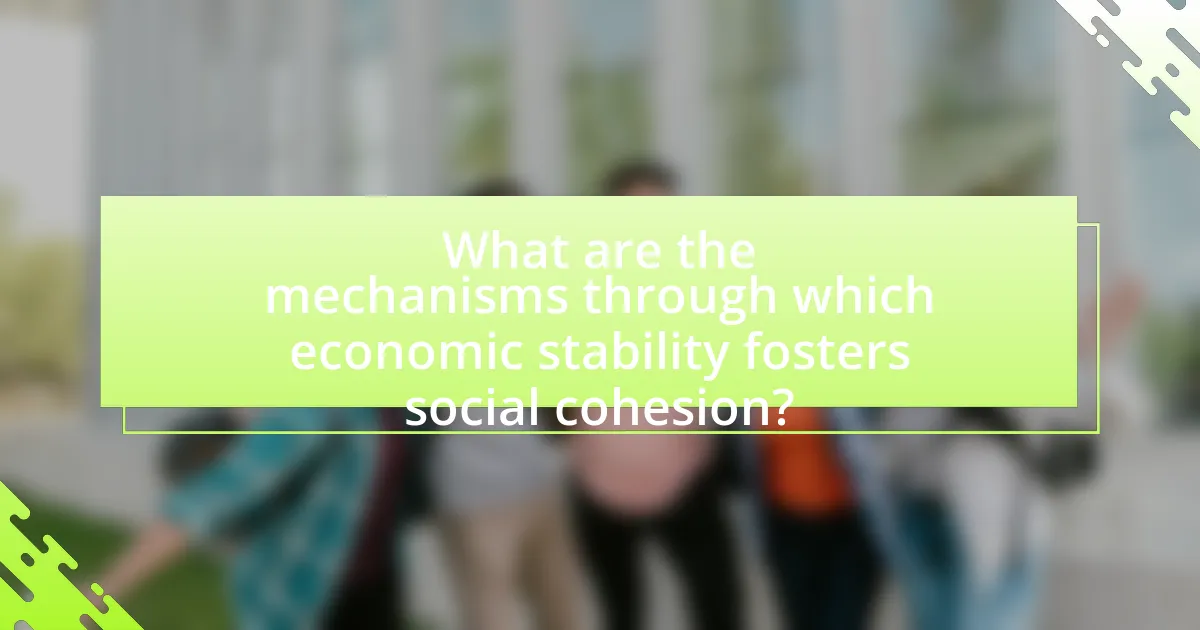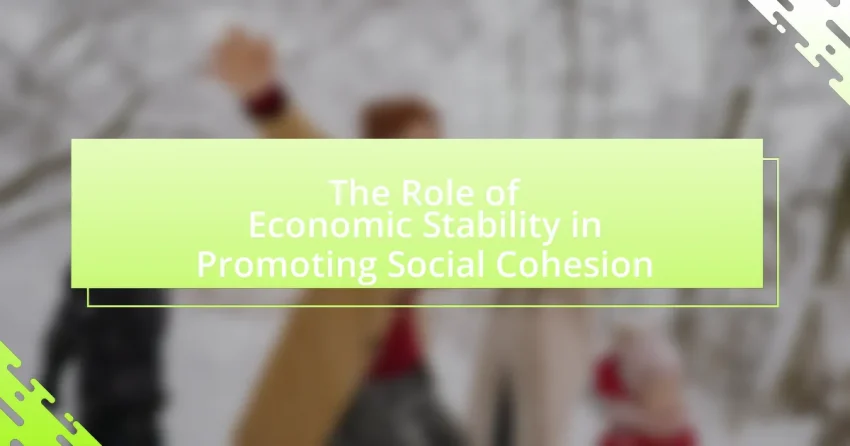Economic stability is a fundamental factor in promoting social cohesion, as it fosters trust and reduces inequality within communities. The article explores how stable economic conditions lead to consistent employment opportunities, enhance social relationships, and contribute to reduced crime rates. Key factors linking economic stability to social cohesion include income equality, access to social services, and job security. Additionally, the article discusses the impact of government policies and community initiatives on maintaining economic stability and fostering social bonds, highlighting the importance of inclusive economic practices for societal well-being.

What is the Role of Economic Stability in Promoting Social Cohesion?
Economic stability plays a crucial role in promoting social cohesion by fostering trust and reducing inequality within communities. When an economy is stable, it typically leads to consistent employment opportunities, which in turn enhances individuals’ financial security and well-being. For instance, countries with lower unemployment rates, such as Germany, often experience higher levels of social trust and community engagement, as citizens feel more secure in their livelihoods. Additionally, economic stability can reduce disparities in wealth and access to resources, which are significant factors in social fragmentation. Research indicates that nations with equitable income distribution, like the Nordic countries, tend to have stronger social cohesion, as citizens perceive a fairer society. Thus, economic stability not only supports individual prosperity but also strengthens the social fabric by promoting inclusivity and collective well-being.
How does economic stability influence social relationships?
Economic stability significantly enhances social relationships by fostering trust and cooperation among individuals. When economic conditions are stable, people experience reduced stress related to financial insecurity, which allows them to engage more positively with others. For instance, a study by the Pew Research Center found that individuals in economically stable environments report higher levels of community involvement and social support. This increased engagement leads to stronger social networks, as people are more likely to participate in communal activities and build relationships when they are not preoccupied with economic concerns.
What are the key factors linking economic stability to social cohesion?
Economic stability is linked to social cohesion through factors such as income equality, employment opportunities, and access to social services. Income equality fosters a sense of fairness and reduces social tensions, as evidenced by studies showing that countries with lower income inequality, like the Nordic nations, tend to have higher levels of social trust and cohesion. Employment opportunities contribute to social cohesion by providing individuals with a sense of purpose and community involvement; for instance, regions with low unemployment rates often report stronger social networks and civic engagement. Access to social services, including healthcare and education, enhances social cohesion by ensuring that all community members can participate fully in society, as demonstrated by research indicating that comprehensive social safety nets correlate with lower crime rates and higher levels of community participation.
How do economic disparities affect community bonds?
Economic disparities weaken community bonds by creating divisions based on wealth and access to resources. When individuals within a community experience significant differences in economic status, social interactions often diminish, leading to isolation and mistrust among different socioeconomic groups. Research indicates that communities with high economic inequality tend to have lower levels of social cohesion, as evidenced by a study published in the American Journal of Sociology, which found that neighborhoods with greater income inequality reported higher rates of crime and lower levels of civic engagement. This lack of engagement further exacerbates the divide, making it difficult for community members to collaborate on shared goals or support one another in times of need.
Why is economic stability essential for societal well-being?
Economic stability is essential for societal well-being because it fosters a predictable environment that supports growth, employment, and social cohesion. When an economy is stable, individuals and families experience consistent income, which reduces stress and enhances quality of life. For instance, according to the International Monetary Fund, countries with stable economic conditions tend to have lower poverty rates and higher levels of education, as families can invest in their futures without the fear of sudden financial crises. This stability also encourages businesses to invest and expand, creating jobs and further contributing to societal well-being.
What are the psychological impacts of economic stability on individuals?
Economic stability positively impacts individuals’ psychological well-being by reducing anxiety and fostering a sense of security. When individuals experience economic stability, they are less likely to face financial stress, which can lead to improved mental health outcomes such as lower rates of depression and anxiety disorders. Research indicates that stable economic conditions correlate with higher levels of life satisfaction and overall happiness, as individuals feel more secure in their ability to meet basic needs and plan for the future. For instance, a study published in the Journal of Economic Psychology found that individuals in economically stable environments reported significantly higher levels of emotional well-being compared to those in unstable conditions.
How does economic stability contribute to reduced crime rates?
Economic stability contributes to reduced crime rates by providing individuals with consistent employment opportunities and financial security. When people have stable jobs and sufficient income, they are less likely to engage in criminal activities as a means of survival. Research indicates that areas with lower unemployment rates often experience lower crime rates; for instance, a study by the National Institute of Justice found that a 1% increase in employment can lead to a 1.5% decrease in property crime. Additionally, economic stability fosters community investment and social cohesion, which further deters crime by promoting collective efficacy and social norms against criminal behavior.

What are the mechanisms through which economic stability fosters social cohesion?
Economic stability fosters social cohesion through mechanisms such as reduced inequality, increased employment opportunities, and enhanced public services. When an economy is stable, income distribution tends to be more equitable, which minimizes social tensions and fosters a sense of belonging among community members. For instance, countries with lower income inequality, such as the Nordic nations, often report higher levels of social trust and cohesion.
Additionally, economic stability leads to job creation, which not only provides individuals with financial security but also encourages social interactions and community engagement. Research indicates that higher employment rates correlate with stronger social networks and community participation.
Furthermore, stable economies can invest in public services like education and healthcare, which contribute to a shared sense of well-being and collective identity. For example, studies show that access to quality education enhances social mobility and fosters connections among diverse groups, thereby strengthening social cohesion.
How do employment opportunities enhance social ties?
Employment opportunities enhance social ties by providing individuals with common ground for interaction and collaboration. When people work together, they build relationships through shared experiences, teamwork, and mutual support, which fosters a sense of community. Research indicates that workplaces often serve as social hubs, where employees form friendships and networks that extend beyond professional boundaries. For instance, a study by the Pew Research Center found that 70% of workers reported having made close friends at their jobs, illustrating how employment settings facilitate social connections. These strengthened ties contribute to social cohesion, as individuals are more likely to engage in community activities and support one another, thereby reinforcing the social fabric of their environments.
What role does job security play in community engagement?
Job security significantly enhances community engagement by fostering a sense of stability and belonging among individuals. When people feel secure in their jobs, they are more likely to invest time and resources into their communities, participate in local events, and support civic initiatives. Research indicates that individuals with stable employment are more inclined to volunteer and engage in community activities, as they possess the financial and emotional bandwidth to contribute positively. For instance, a study by the Urban Institute found that job security correlates with higher levels of community involvement, as secure workers are less stressed and more focused on collective well-being. This connection underscores the importance of economic stability in promoting social cohesion within communities.
How does income equality promote trust among citizens?
Income equality promotes trust among citizens by reducing perceived social divisions and fostering a sense of shared identity. When income is distributed more evenly, individuals are less likely to view each other through the lens of economic disparity, which can lead to resentment and distrust. Research indicates that societies with lower income inequality, such as those in Scandinavia, often report higher levels of social trust and cohesion. For instance, a study published in the American Sociological Review found that income equality correlates with increased trust in institutions and fellow citizens, as people feel more secure and valued within their community. This sense of security encourages cooperation and collective action, further enhancing social bonds.
What impact does government policy have on economic stability and social cohesion?
Government policy significantly influences economic stability and social cohesion by establishing regulations, fiscal measures, and social programs that directly affect economic performance and community well-being. For instance, policies that promote job creation and equitable income distribution can enhance economic stability, as evidenced by the correlation between low unemployment rates and increased social trust in countries like Denmark and Sweden. Furthermore, government initiatives aimed at reducing inequality, such as progressive taxation and social welfare programs, foster social cohesion by ensuring that marginalized groups have access to resources and opportunities, thereby reducing social tensions. Research from the International Monetary Fund indicates that inclusive policies contribute to both economic growth and social stability, highlighting the critical role of government action in shaping these interconnected outcomes.
How do social welfare programs support economic stability?
Social welfare programs support economic stability by providing financial assistance and resources to individuals and families in need, which helps to reduce poverty and inequality. These programs, such as unemployment benefits, food assistance, and housing support, enable recipients to maintain a basic standard of living, thereby stabilizing consumer spending and stimulating economic growth. For instance, during economic downturns, research shows that every dollar spent on unemployment benefits generates approximately $1.50 in economic activity, as recipients are likely to spend this money on essential goods and services. This increased consumer demand can help to sustain businesses and preserve jobs, contributing to overall economic stability.
What policies are most effective in promoting both economic stability and social cohesion?
Inclusive economic policies, such as progressive taxation and social safety nets, are most effective in promoting both economic stability and social cohesion. These policies ensure equitable distribution of resources, reducing income inequality, which fosters social trust and community engagement. For instance, countries with robust welfare systems, like the Nordic nations, demonstrate lower poverty rates and higher levels of social cohesion, as evidenced by the OECD’s findings that highlight the correlation between social spending and overall societal well-being. Additionally, investment in education and job training programs enhances workforce skills, leading to economic resilience and a more cohesive society, as shown by studies indicating that higher education levels correlate with lower crime rates and increased civic participation.

What challenges exist in maintaining economic stability for social cohesion?
Maintaining economic stability for social cohesion faces several challenges, including income inequality, unemployment, and inflation. Income inequality can lead to social unrest, as disparities in wealth create divisions among communities. For instance, the Gini coefficient, which measures income distribution, indicates that countries with higher inequality often experience lower social cohesion. Unemployment exacerbates this issue, as joblessness can lead to increased crime rates and social discontent, evidenced by studies showing that regions with high unemployment correlate with higher rates of social instability. Inflation further complicates economic stability, as rising prices erode purchasing power, disproportionately affecting lower-income households and leading to increased dissatisfaction and social fragmentation.
How do economic crises affect social structures?
Economic crises significantly disrupt social structures by increasing inequality, eroding trust in institutions, and fostering social unrest. During economic downturns, unemployment rates rise, leading to greater financial strain on families and communities, which exacerbates existing social divides. For instance, the 2008 financial crisis resulted in a 10% increase in poverty rates in the United States, highlighting how economic instability can deepen social disparities. Additionally, as resources become scarce, social cohesion weakens, leading to increased tensions and conflicts within communities. Historical data shows that economic crises often correlate with higher rates of crime and civil unrest, as seen in the protests during the Great Depression and the Arab Spring, where economic grievances fueled social movements.
What are the long-term effects of recession on community relationships?
The long-term effects of recession on community relationships include increased social fragmentation, diminished trust among residents, and weakened support networks. Economic downturns often lead to job losses and financial strain, which can cause individuals to withdraw from community engagement and social activities. Research indicates that during the Great Recession of 2007-2009, communities experienced a rise in social isolation and a decline in civic participation, as people prioritized personal survival over collective well-being. Additionally, prolonged economic hardship can exacerbate inequalities, leading to tensions and divisions within communities, further eroding social cohesion.
How can societies recover from economic instability to restore social cohesion?
Societies can recover from economic instability to restore social cohesion by implementing targeted economic policies that promote job creation and equitable resource distribution. For instance, investing in infrastructure projects can stimulate employment and improve community services, fostering a sense of belonging and shared purpose among citizens. Historical examples, such as the New Deal in the United States during the Great Depression, demonstrate that government intervention can effectively reduce unemployment and enhance social unity. Additionally, promoting inclusive economic growth through education and training programs can empower marginalized groups, thereby strengthening social ties and reducing inequality. Research indicates that societies with lower income inequality tend to exhibit higher levels of social cohesion, as evidenced by studies from the OECD, which highlight the correlation between economic equity and social stability.
What strategies can be implemented to enhance economic stability and social cohesion?
Implementing progressive taxation, investing in education and job training, and promoting inclusive economic policies can enhance economic stability and social cohesion. Progressive taxation ensures that wealthier individuals contribute a fair share, which can fund social programs that benefit the broader community. For instance, countries with higher tax rates on the wealthy, like Sweden, have lower income inequality and stronger social cohesion. Investing in education and job training equips individuals with skills necessary for the evolving job market, reducing unemployment and fostering a sense of community. Research by the Organisation for Economic Co-operation and Development (OECD) indicates that countries that prioritize education see improved economic outcomes and social integration. Lastly, inclusive economic policies that support marginalized groups can bridge social divides, as evidenced by initiatives in countries like Canada, which have successfully integrated diverse populations into the workforce, enhancing both economic stability and social cohesion.
What role do community initiatives play in fostering economic resilience?
Community initiatives play a crucial role in fostering economic resilience by enhancing local capacities and promoting sustainable development. These initiatives often focus on building networks among residents, which can lead to increased collaboration and resource sharing, thereby strengthening the local economy. For instance, community-supported agriculture programs not only provide fresh produce but also create jobs and stimulate local spending, contributing to economic stability. Research indicates that communities with strong social ties and active participation in local initiatives are better equipped to withstand economic shocks, as evidenced by studies showing that neighborhoods with robust community organizations recover more quickly from downturns.
How can education contribute to both economic stability and social cohesion?
Education contributes to both economic stability and social cohesion by equipping individuals with skills necessary for the workforce and fostering a sense of community. A well-educated population enhances productivity, leading to economic growth; for instance, the OECD reports that each additional year of schooling can increase a person’s income by up to 10%. Furthermore, education promotes social cohesion by encouraging civic engagement and reducing inequalities, as evidenced by studies showing that higher education levels correlate with increased participation in democratic processes and community activities. This dual impact of education on the economy and society underscores its critical role in fostering a stable and cohesive environment.
What best practices can communities adopt to promote economic stability and social cohesion?
Communities can adopt best practices such as fostering local entrepreneurship, enhancing access to education and job training, and promoting inclusive policies to promote economic stability and social cohesion. Fostering local entrepreneurship encourages job creation and stimulates the local economy, which can lead to increased community engagement. Enhancing access to education and job training equips individuals with skills necessary for employment, thereby reducing unemployment rates and fostering a sense of belonging. Promoting inclusive policies ensures that all community members, regardless of background, have equal opportunities to participate in economic activities, which strengthens social ties and reduces inequality. Research indicates that communities with strong local economies and inclusive practices experience lower crime rates and higher levels of civic participation, demonstrating the link between economic stability and social cohesion.
